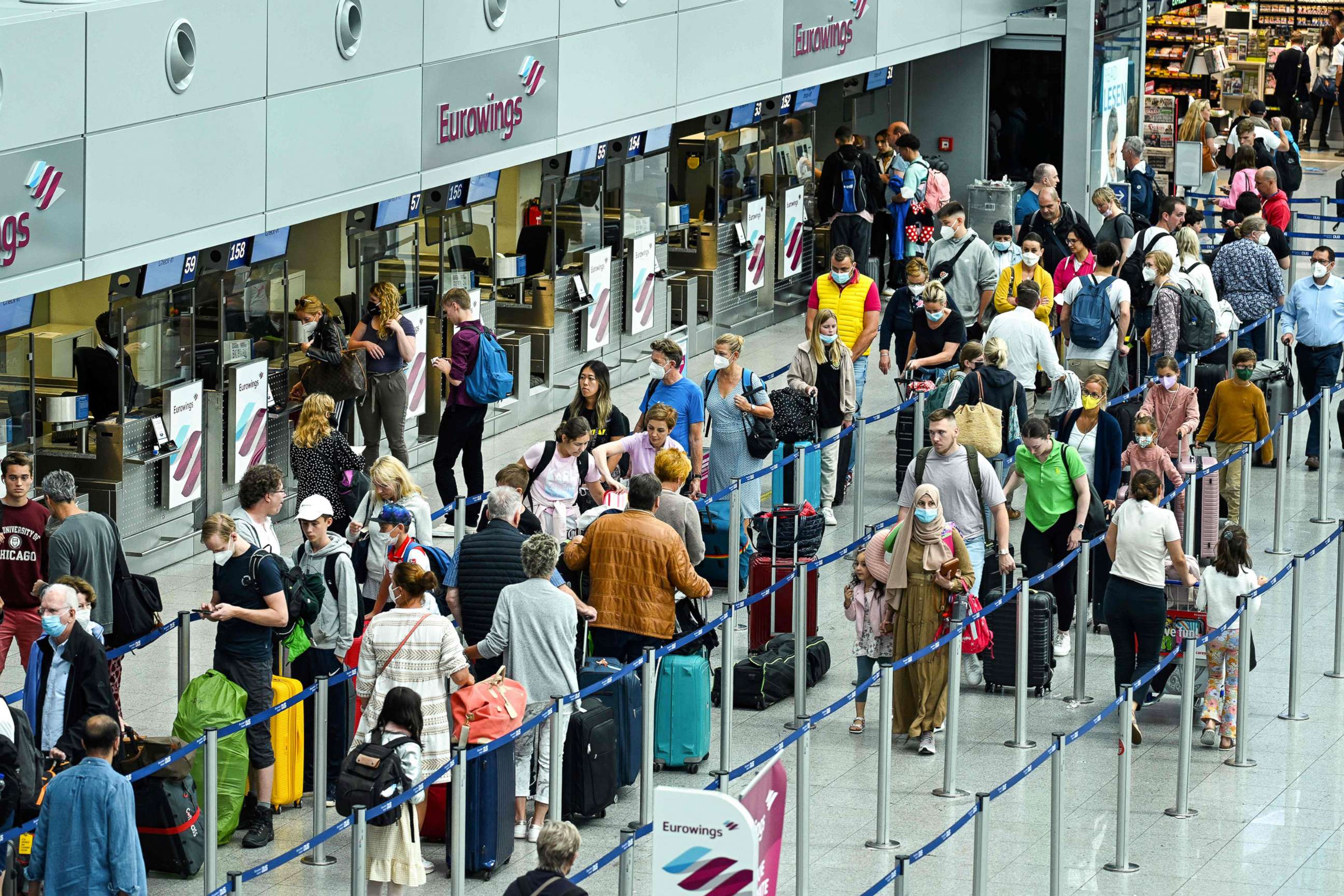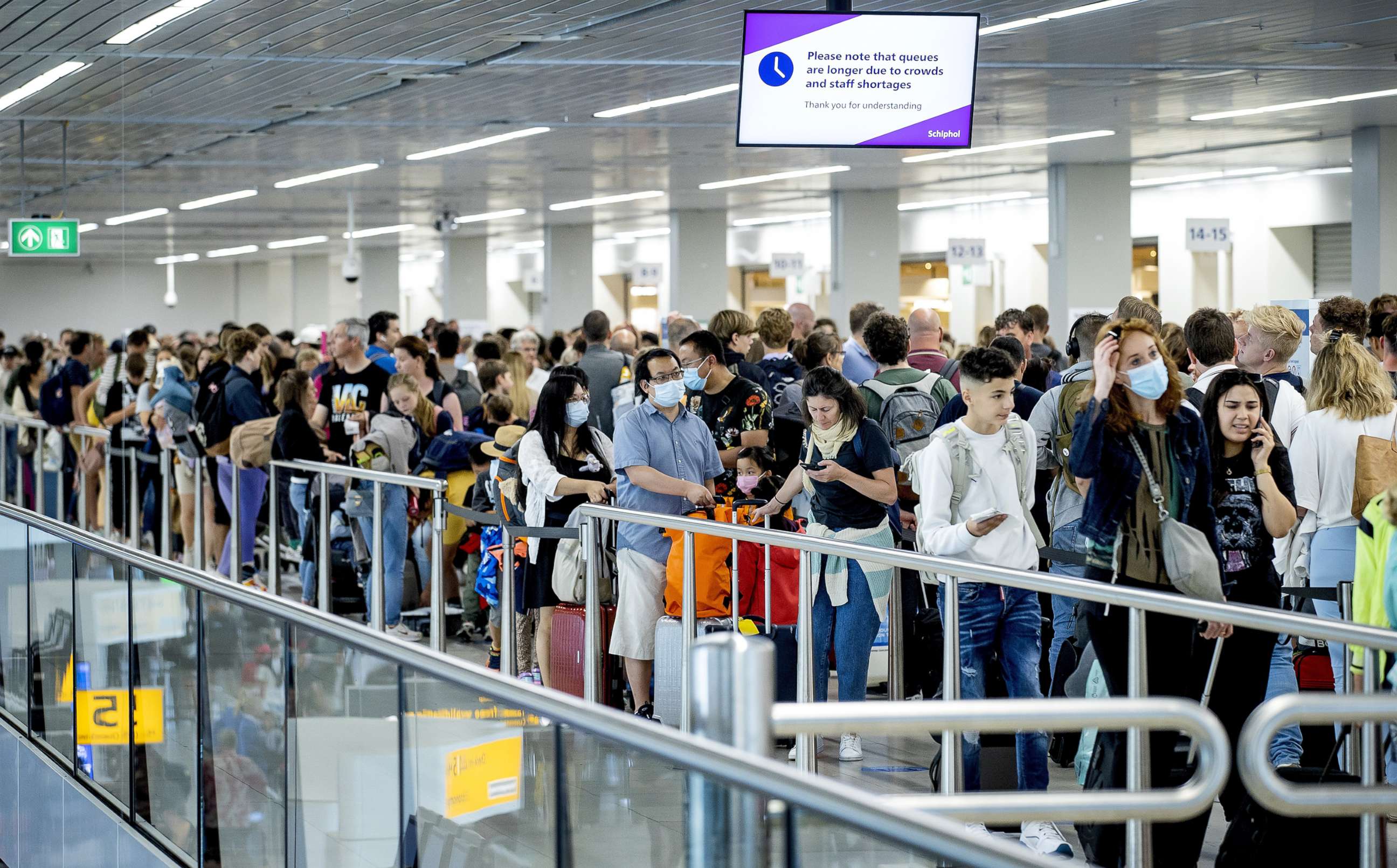What to know if you're flying to Europe this summer
"Northern Europe is where the chaos has been," one expert said.
As millions have returned to the skies around the world, European airports have struggled to keep up, leading them in some cases to limit the number of daily travelers and forcing airlines to stop selling tickets.
With the lifting of COVID-19 mandates, demand for international travel has increased. For example, the booking site Expedia said it has seen double-digit increases in the past week in searches for international destinations.
“In Europe, they've been facing the same sorts of pressures that we have in the United States between a rapid rebound in travel demand and caught flat footed without enough employees and workers at airports and airlines,” Scott Keyes, founder of Scott’s Cheap Flights, said in an interview with ABC News.
Airports capping the number of passengers this summer
In an attempt to avoid widespread cancellations and delays amid staffing shortages, various airports abroad are placing limits on the number of passengers allowed to fly through this summer.
London’s Heathrow Airport said Tuesday that it’s limiting the number of passengers and also asked airlines to stop selling tickets.
The airport will only allow 100,000 passengers a day over the summer but said current forecasts indicate airlines will fly 104,000 seats a day -- because of this, Heathrow asked carriers “to stop selling summer tickets to limit the impact on passengers.”

"By making this intervention now, our objective is to protect flights for the vast majority of passengers at Heathrow this summer and to give confidence that everyone who does travel through the airport will have a safe and reliable journey,” Heathrow CEO John Holland-Kaye said in a statement.
Keyes called Heathrow’s move “unprecedented,” saying it could negatively impact consumers.
“This could mean cancellations, this could mean folks getting rerouted and is really, I think, going to be disruptive for many people's travel plans,” Keyes told ABC.
London’s Gatwick Airport is also putting a restriction on the number of passengers per day it will allow. The airport said it would “temporarily moderate” its rate of growth for July and August by gradually increasing capacity.
“During this peak holiday period, the airport will carefully and gradually increase its declared capacity -- starting at 825 flights a day in July and then up to 850 flights a day in August -- so that passengers experience a more reliable and better standard of service,” the airport said in a statement.
Amsterdam’s Schiphol International Airport said last month that a "tight labor market" has led to a shortage of security employees, creating long lines for passengers. To curb the travel chaos, Schiphol will only allow up to 67,500 passengers on the busiest days in July and up to 72,500 in August.
"A lot is possible at Schiphol this summer, but not everything,” airport CEO Dick Benschop said in a statement. “Setting a limit now means that the large majority of travelers will be able to travel from Schiphol in a safe and responsible way."
American Airlines stopped selling tickets on flights out of Amsterdam through July. United Airlines cancelled its flight between Amsterdam and Washington Dulles International airport after Dutch Authorities asked airlines to help limit the number of daily passengers.
Shortages lead to stress
Staffing issues are permeating the aviation industry. During the pandemic, airline employees took early retirements and voluntary buyouts. But as demand increased, carriers haven’t been able to up their staffing in time.
“This is both a shortage of pilots but it's even a shortage, especially in Europe, of baggage handlers, of security officials, of gate agents,” Keyes said. “That's causing there to be an even more extraordinary number of flight delays, cancellations, disruptions, lost bags, all the sorts of travel chaos that travelers hope to avoid, especially during the summer months.”
Executives at Lufthansa Airlines sent a letter to passengers in late June warning of the travel mess, saying the increase in demand was "clearly not proceeding with the reliability, the robustness, and the punctuality that we would like to offer you again."
"Too many employees and resources are still unavailable, not only at our infrastructure partners but in some of our own areas too," the executives wrote.
Strikes at various airlines and airports are another headache for some major European airlines. Pilots for SAS, or Scandinavian Airlines, went on strike in early July after contract negotiations fell through.
In a statement, SAS said it would have to cancel 50% of scheduled flights because of the strike, which it said would impact 30,000 passengers per day.
European budget airline EasyJet, which already had to slash flights earlier this summer because of logistical problems, is expecting flight crews across Spain to strike for three busy weekends in the month of July.

Brian Kelly, the founder of The Points Guy, told ABC News that there are "more strikes on the horizon" for airlines across Europe which could be disastrous for travelers.
"When there's an entire strike, there's nothing you can do," Kelly said. "The airline can't even send another flight to get you to where you're going. So beware, understand where strikes are going to happen and also understand your rights."
How you can prepare
Experts said there are things travelers can do to minimize problems ahead of time. When it comes to booking, nonstop flights reduce the possibility of losing bags or experiencing a missed or cancelled connection.
"When possible, fly nonstop," Kelly said. "Any time you add in a connection, you're asking for trouble."
But, if travelers do have to take a connection, Keyes recommends looking to airports where operations have been smooth.
"If you have a choice of where you might connect onward to your final destination, I would prioritize those airports in Spain and Portugal and others over the airports in, say, Netherlands or the United Kingdom, because Northern Europe is where the chaos has been," Keyes said.
Other good rules of thumb, according to travel booking platform Hopper, are to fly early in the day and to build buffer days into travel plans just in case of any meltdowns.
What to do if you are delayed or canceled
Experts said that early delays or cancellations could work in a traveler's favor if it happens in advance. Keyes said that a cancellation can be "actually an opportunity to get a more convenient flight at no extra cost."
In order to prevent travelers from cashing in on a refund, Keyes said they might instead be able to get on a better flight, such as a direct flight or one scheduled for a better time of day.
"Don't be afraid to ask for a better flight than you had originally booked," Keyes said. "Whether it's different dates, whether it's a more direct route, whether it's just connecting through a more reliable airport because you won't have to pay for those changes if the airline grants it to you."
In addition to another flight, travelers can be eligible for serious compensation under European regulation 261, requiring airlines to compensate people up to €600 per person for major delays.
Keyes stressed that travelers should stay flexible, especially because he does not expect the intense delays to end any time soon.




